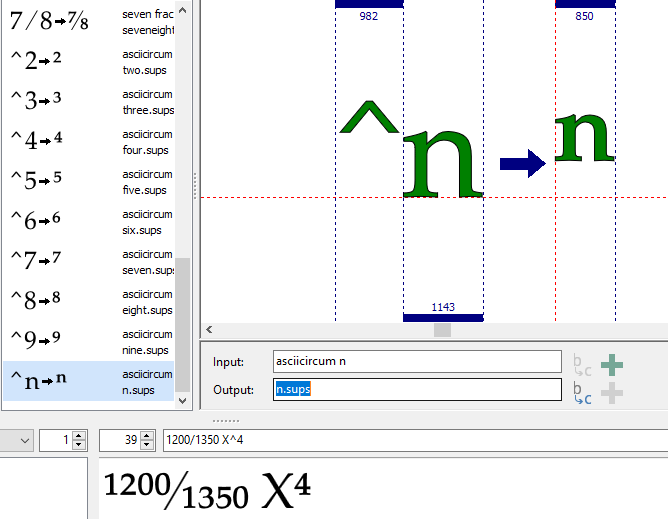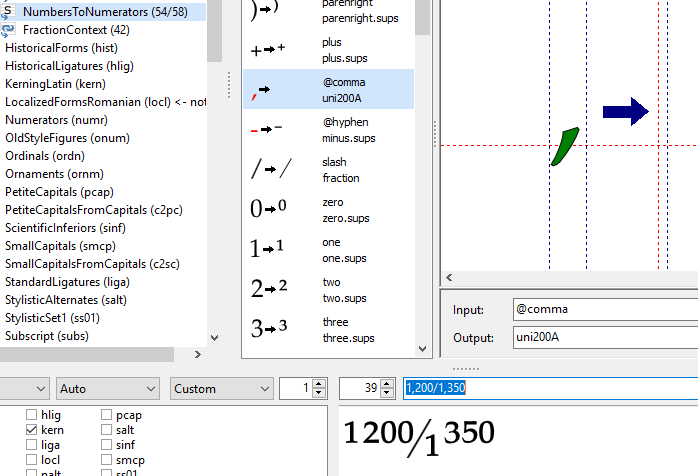Page 3 of 3
Re: OpenType Features: Order of Precedence
Posted: Mon May 29, 2017 11:27 am
by Erwin Denissen
Bhikkhu Pesala wrote:I am still trying to understand what Mike means by "a run of text."
OpenType layout features are processed per "run of text". This means text is divided into smaller segments. Each new line will cause such split, but also a switch between Scripts, e.g. if Latin and Hebrew text is mixed, they will be split into separate segments. That is why kerning pairs between different scripts will never work.
Re: OpenType Features: Order of Precedence
Posted: Mon May 29, 2017 11:44 am
by Erwin Denissen
Would this work if both frac and ordn are activated:

- fraction.png (13.03 KiB) Viewed 12514 times
Re: OpenType Features: Order of Precedence
Posted: Mon May 29, 2017 11:54 am
by Bhikkhu Pesala
Erwin Denissen wrote:Would this work if both frac and ordn are activated:
That looks fine to me. However, I am not too sure if the superscripted x in 2x would be expected.
As far as I know, only d, h, n, r, s, t, è and ú are valid for
ordinal numbers, but there may be others in other languages.
Abbreviations like M
lle for Mademoiselle are not Ordinals.
I think that Spanish ordinals ªº are Latin-1 Supplement glyphs, and should not use ordinals either.
Re: OpenType Features: Order of Precedence
Posted: Mon May 29, 2017 1:50 pm
by Alfred
Bhikkhu Pesala wrote:That looks fine to me. However, I am not too sure if the superscripted x in 2x would be expected.
I am sure that the superscripted x in 2x would not be expected. In normal mathematical notation, 2x means "2 times x" but 2 followed by a superscript x means "2 to the power x" (i.e. 2 multiplied by itself x times).
Bhikkhu Pesala wrote:I think that Spanish ordinals ªº are Latin-1 Supplement glyphs, and should not use ordinals either.
I think the same.
Re: OpenType Features: Order of Precedence
Posted: Mon May 29, 2017 1:58 pm
by MikeW
Alfred wrote:...
I am sure that the superscripted x in 2x would not be expected. In normal mathematical notation, 2x means "2 times x" but 2 followed by a superscript x means "2 to the power x" (i.e. 2 multiplied by itself x times).
In setting math equations without the benefit of MathType or one of the other equation editors (I rarely got Word's equations), the /x would have not been next to the 2 if it had been meant for a multiplication operator. If there is no space type it is meant as a "power of" operator.
Setting equations is by far the most laborious of any layout work. It gets checked, double & triple checked throughout the editing process by multiple parties. Even so, there is almost always a mistake (well, more than one) somewhere in a book.
Re: OpenType Features: Order of Precedence
Posted: Mon May 29, 2017 6:21 pm
by Bhikkhu Pesala
How about adding some standard fractions for powers?

- Powers.png (25.27 KiB) Viewed 12494 times
I also looked for ways to accommodate thousand separators and periods. I have a kerning class that includes period, comma, and ellipsis. By adding a substitution for that with hair space, numerators work OK, but denominators break the fraction.

- Separators.png (24.83 KiB) Viewed 12491 times
Re: OpenType Features: Order of Precedence
Posted: Mon May 29, 2017 8:07 pm
by MikeW
Never seen a real world use of large fractions with a separator before. Are separators used in the UK or the Continent with large fractions?
Re: OpenType Features: Order of Precedence
Posted: Mon May 29, 2017 9:36 pm
by Erwin Denissen
Bhikkhu Pesala wrote:How about adding some standard fractions for powers?
I don't think frac is intended for this.
Re: OpenType Features: Order of Precedence
Posted: Mon May 29, 2017 9:58 pm
by PJMiller
I would be happy if the fractions feature just did fractions!

Re: OpenType Features: Order of Precedence
Posted: Mon May 29, 2017 10:12 pm
by MikeW
It does just do fractions...but the feature is dumb, not smart. Which is why we are all going through this fun exercise to fool the end applications to do our bidding without user intervention.
We all can be smarter than what most/many applications are capable of using. When we find an application that fails in processing our fonts and their instructions, we all ought to be contacting those application makers about the problem...after we make sure that our coding is correct anyway. This works for a few companies, not so well with a particular monolithic company.
It's sort of a chicken and egg thing. If we don't stretch what is currently possible and complain, they won't fix their stuff. On the other hand, unless users make use of such features then those companies see no compelling reason to fix or even expand their OT Feature support. InDesign has spotty feature support, QXP has a larger feature support and is still growing (both ID & QXP as regads westers scripts, but ID supports middle eastern languages and Q doesn't natively yet) . AD has the most complete and functional support for western scripts and makes a great test bed.